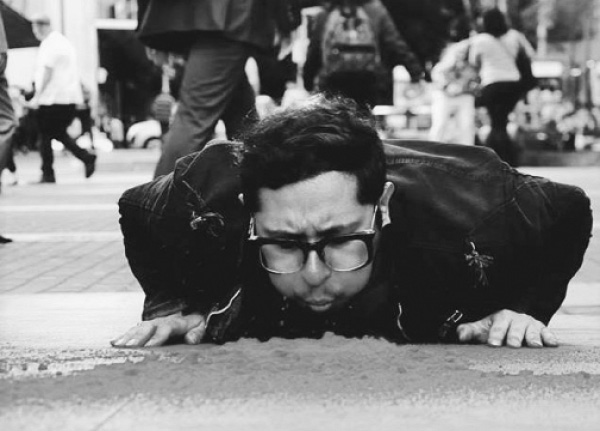
UTOPIA IS ON THE HORIZON
first performed on July 25, 2017
September Seven Square, Belo Horizonte, Minas Gerais, Brazil
performed once in 2017
FAUSTO GRACIA
México / Brazil
faustogracia.wixsite.com/fgracia
UTOPIA IS ON THE HORIZON
FAUSTO GRACIA
This action was made in the framework of a performance art meeting called Perpendicular Invisible created by the Brazilian artist Wagner Rossi Camps. This meeting was based on dialogue about all the invisible, micro-political and forms of resistance, which from the artistic practice was enhanced in different points of Latin America. My action was carried out in Praça Sete de Setembro in the city of Belo Horizonte-Minas Gerais, Brazil. This action is based on the phrase of the writer Eduardo Galeano:
“Utopia is on the horizon. I walk two steps, she takes two steps away and the horizon runs ten steps further. So, what does utopia work for? For that, it’s good for walking.”
I had with me a speech bag containing two kilos of powdered urucum seeds. This is an endemic tropical fruit that indigenous peoples use to paint their skins, protect themselves from the sun, and as a symbol of thanks to their gods for the harvest and health of their people. The action consisted of placing the urucum on the floor and beginning to blow until it spread all over the ground, opening a path and leaving a trail. The action had an intention: do not stop until finished with all the dust. During the action I had the participation of several children who helped me to blow, some of them as a game. Several people asked the reason of what I was doing. This action managed to create dialogue with the space and the people who passed by, which for me is important because it did not imply the imposing of an order from an artistic vision. The action responded to the need to bring indigenous themes to the public space. From the symbolic, I tried to distill the value of our original cultures and show how, in the paradigm of colonized thought, we continue to deny our roots.
It is very important to me to talk about indigenous culture in a context like Brazil—a country where the reality of the indigenous community is terrible. They are massacred, isolated, and looted constantly. That is why I took a persepctive based in my own roots as a Mexican with indigenous blood. I was interested in talking about it in a poetic way, without trying to appropriate a reality that I do not know, but with a social conscience about their situation.